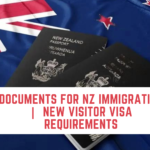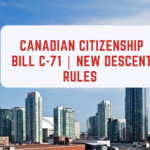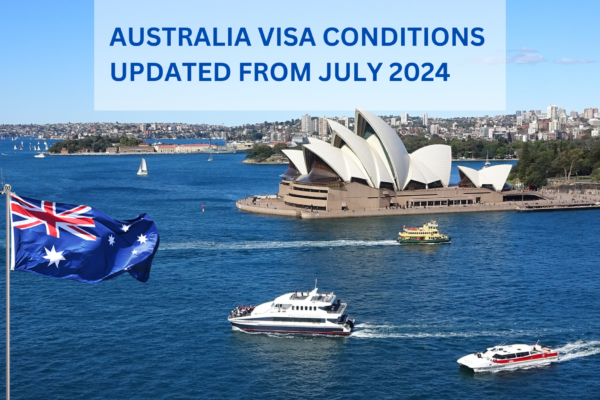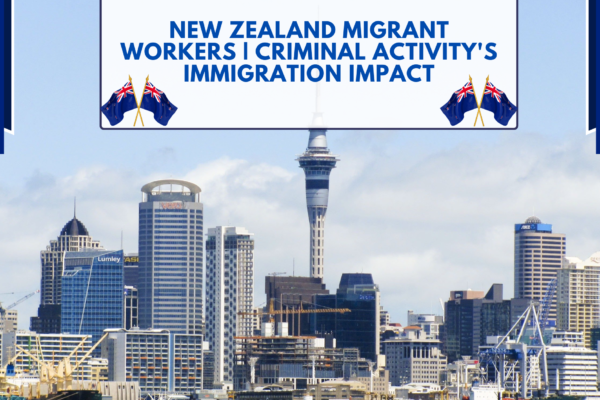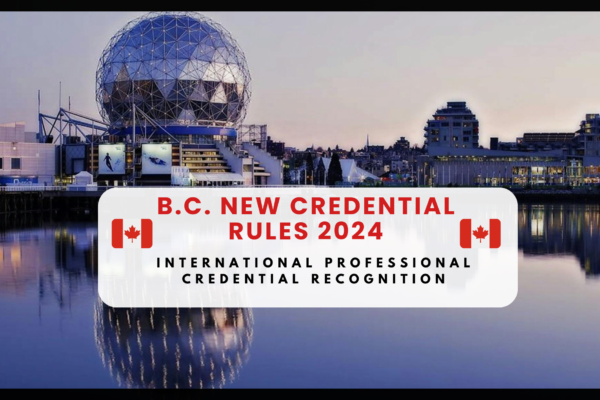
B.C. New Credential Rules 2024
A Streamlined Path to Professional Recognition British Columbia’s New Credential Rules 2024 will begin on July 1st, when the International Credentials Recognition Act takes effect. The purpose of this law is to modernise the province’s procedure for recognising foreign credentials. The Act seeks to streamline the application process for a variety of professions by doing away with the necessity for Canadian work experience, lowering language test requirements for certain applicants, and doing away with extra costs for foreign candidates. 29 various industries, including engineering, accountancy, real estate, healthcare, and more, will be impacted by these revisions. The B.C. New Credential Rules 2024 mark a significant turning point in the province’s plan to accept professionals with international training. The province aims to attract and retain top talent from across the world by facilitating credential recognition, which will allow qualified individuals to contribute without needless obstacles and more easily integrate into the economy. In order to make British Columbia an even more desirable location for outstanding talent from throughout the world, the B.C. New Credential Rules 2024 represent a major advancement in lowering barriers for those with foreign training. Effect on Diverse Occupations Many different occupations will be impacted by the B.C. New Credential Rules 2024. The law was drafted with input from eighteen regulatory groups and approved by the British Columbia Legislative Assembly in November of last year. Below is a detailed list of all the vocations that the Act affects: Experience Criteria for Employment Requirements for Canadian work experience that were superfluous have been removed in the B.C. New Credential Rules 2024. In order to evaluate existing procedures and identify any Canadian work experience requirements that will be prohibited by the B.C. New Credential Rules 2024, the Ministry of Post-Secondary Education and Future Skills is working with regulatory bodies. Still, the government acknowledges that in certain cases, there can be good reasons to need Canadian job experience. As such, a regulator who presents a good case to the supervisor of international credential recognition may be granted an exception. In addition, the work experience requirement involves a one-year transitional period. Jan. 1, 2025 will see the implementation of specific rules outlining the exclusions and forbidden Canadian work experience. On July 1, 2025, the B.C. New Credential Rules 2024 will go into effect, prohibiting the need for Canadian work experience. Language Proficiency Requirements Candidates for certain professions will not be required to submit fresh English language test results if they have previously submitted legitimate ones, according to the B.C. fresh Credential Rules 2024. The B.C. New Credential Rules 2024 include a clause that is only applicable to professionals with foreign training who have previously submitted valid language test results as part of the certification procedure. But in certain circumstances, more language testing could still be necessary in accordance with the B.C. New Credential Rules 2024. In the event that an applicant’s application to a regulatory authority remains unanswered after five years or if no decision has been made during the international credential evaluation procedure, more language testing may be required. Other Changes The B.C. New Credential Rules 2024 guarantee that foreign applicants won’t pay more to their regulating bodies than those who apply domestically. In addition, the province will appoint a superintendent of international credential recognition to manage difficulties with procedures and expedite the procedure for professionals with foreign training. The goal of these modifications under the B.C. New Credential Rules 2024 is to provide a more effective and fair system. One important step in easing the integration of qualified professionals into the community workforce is the introduction of the B.C. New Credential Rules 2024. Recognition of International Credentials in Canada Acknowledging foreign qualifications is an essential first step for any immigrant hoping to work in Canada as a licenced professional. These licences are usually issued by provincial regulatory bodies, such as those governing skilled crafts or the medical field. The qualifications differ based on the applicant’s residence since they are provincial in nature.The lengthy, expensive, and complicated procedure of getting foreign credentials recognised has often been criticised by newcomers. A research published in 2022 by Employment and Social Development Canada identified a number of important problems, one of them being the lack of information provided to immigrants, especially during the pre-arrival phase. The federal government of Canada has taken steps to make it easier for immigrants to get their credentials recognised in order to solve these issues. For example, the government declared in its Autumn Economic Statement 2023 that it would be allocating $50 million to the Foreign Credential Recognition Programme, of which half would be used for the healthcare industry and the other half for skilled crafts professions. The B.C. New Credential Rules 2024, which also seek to expedite the credential recognition process, are in accord with the objectives of this programme.In this regard, the B.C. New Credential Rules 2024 are important since they are a part of larger initiatives to facilitate the recognition of globally educated professionals’ credentials and their faster entry into the workforce. Significance of the B.C. New Credential Rules 2024 The province’s attempts to recruit and retain top talent from across the world have advanced significantly with the introduction of the B.C. New Credential Rules 2024. British Columbia wants to remove needless barriers that prevented foreign-trained professionals from making contributions to the province’s economy by expediting the credential recognition process. Enhancing accessibility and efficiency are the goals of efforts such as removing the need for Canadian work experience, streamlining language proficiency exams, and eliminating extra costs for foreign candidates. The province as a whole and those looking to have their credentials recognised are anticipated to gain from these changes, which will speed up and improve the admission of qualified professionals into the workforce. Benefits for the Economy The B.C. New Credential Regulations, which will go into effect in 2024, are expected to benefit the provincial economy. Through streamlining the process of validating credentials, British Columbia hopes to increase its attractiveness to highly skilled people throughout…





